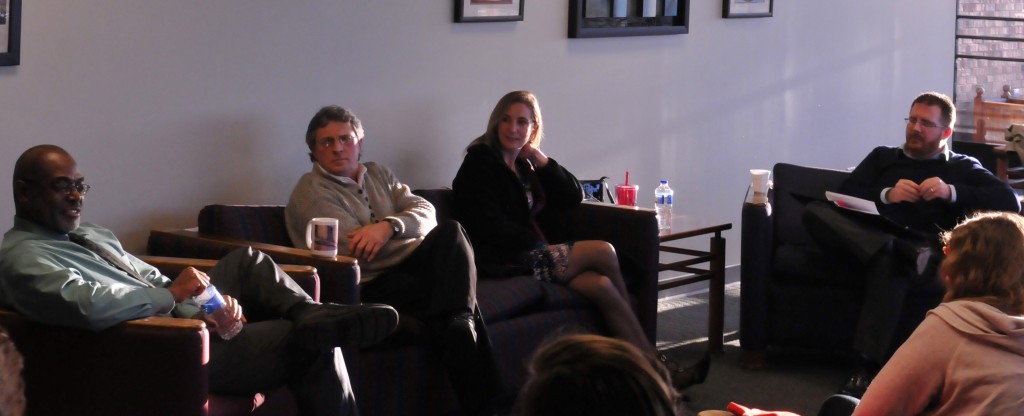By Meredith Kreigh
Triangle Writer

Dean of Community Life Bruce Morgan said that when he first came to Bryan in 1978, he was one of 13 students of color in the college of 530 students.
“At that time,” he said, “schools were being desegregated. I am not sure if it has really improved that much.”
Students gathered on the second floor of Latimer to hear stories and advice concerning cultural diversity on Martin Luther King Day, Jan. 21. The panel consisted of Morgan, Communications Professor Michael Palmer and Spanish Professor Michele Pascucci, while Assistant Director of Worldview Formation Jason Glen mediated.
The panel provided several different perspectives on race relations around the world.
Each individual echoed what Morgan said: begin with yourself when it comes to dealing with diversity.
South African Palmer, who moved to the Congo at age 2, said “It was very cosmopolitan. There was a very blended set of people. And then I went to Southeastern University (in Lakeland, Fla.) and saw very limited ethnicity.”
“Before I came to the States,” continued Palmer, “I thought this place was much better at diversity. Then I stepped off of the boat and realized that you people were as crazy as us.”
Pascucci spent five years teaching Spanish in Japan. She recalled that people would sometimes point and call her an “outsider.” Most of the discrimination she found was positive.
“I kinda felt like a rock star,” she said.
Glen asked the panel to share how their Christian beliefs influenced the way they saw discrimination.
First to speak, Morgan said that, as a believer, he didn’t have a right to hold onto bitterness.
When Palmer was growing up in the Apartheid, he took a more active resistance to the institutionalized discrimination. Palmer and his peers would watch the police so that people could move about and interact with other people, without police harassment.
“You had to have papers to be in certain areas of South Africa,” Palmer said. “By standing up against that to help my neighbors, I saw an acute sense of justice. Also, graciousness and forgiveness were necessary in interactions.”
When Pascucci met a person who was very different than her, she had to take a step back and analyze her reaction.
While in Spain, Pascucci’s host mother was a card-holding member of the Communist Party.
“I had to ask myself: Are these things wrong because of political affiliation or are they just wrong? You have to bring things like that into dialogue. Learn how to listen.
Palmer offered a tip for students engaging another culture, saying you can only know your own cultural experiences.
“So you have to be respectful,” he said


